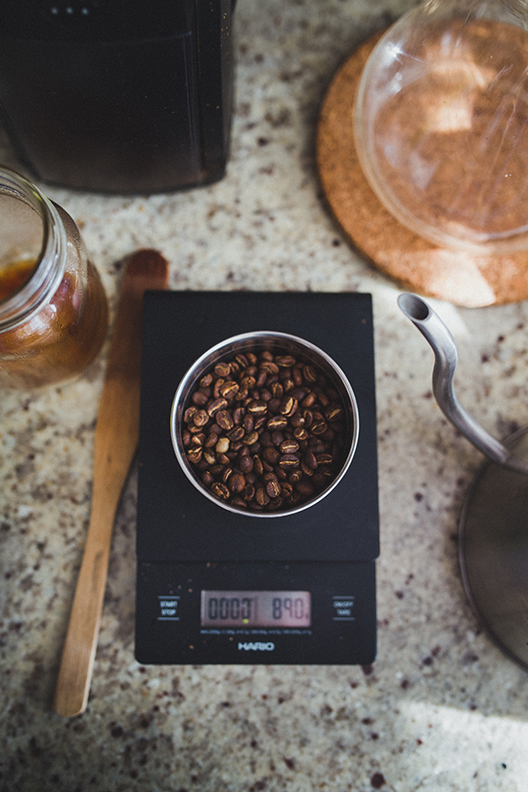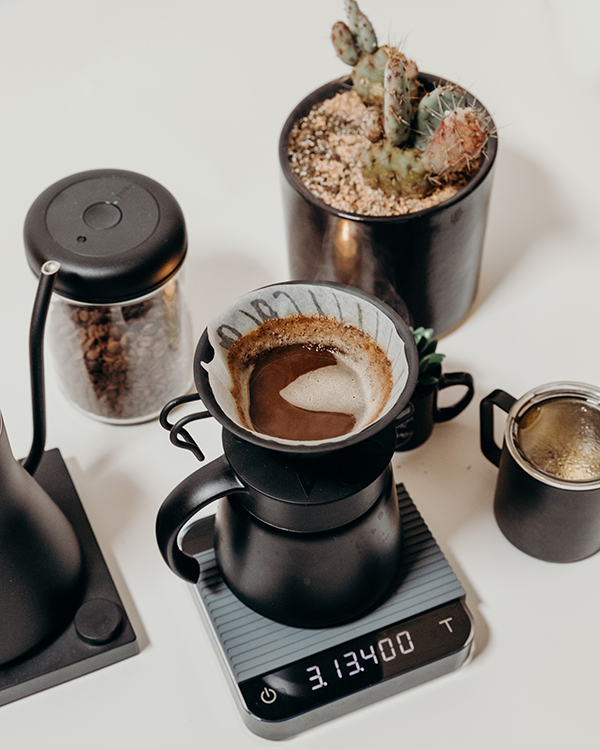In the world of coffee brewing, precision is vital. The difference between a nice cup of coffee and excellent one often lies in the details – the coffee beans, the water temperature, the brewing time, and most importantly, the coffee-to-water ratio.
It is where a coffee scale comes into play. It’s not just a tool; it’s a game-changer. Read on to find all about mastering the use of coffee scales in brewing.
| Key Takeaways | |
|---|---|
| 1 | Precision is key in coffee brewing. A coffee scale allows for precise measurements of coffee and water, ensuring the right coffee-to-water ratio every time. |
| 2 | A coffee scale is an indispensable tool for achieving consistency in coffee brewing. It allows you to replicate your brewing process with precision, ensuring the same delicious cup of coffee every time. |
| 3 | Mastering the use of coffee scales is a journey of discovery and refinement. It’s about understanding the science of coffee brewing and using that knowledge to create your perfect cup of coffee. |
The Importance of Precision in Coffee Brewing
Precision in coffee brewing is all about consistency and control. It’s about replicating that perfect cup of coffee every single time and this is where the coffee scale shines. It lets you measure your coffee and water down to the gram, ensuring you get the correct coffee-to-water ratio every time.
It is crucial because even a slight variation in this ratio can significantly alter the taste of your coffee.

Understanding Coffee Scales
Coffee scales are not your average kitchen scales. They are designed with features that cater specifically to the needs of coffee brewing.
Most coffee scales come with a built-in timer, essential for keeping track of your brew time. They also have a high degree of accuracy, usually within 0.1 grams. It allows for precise measurements of your coffee and water.
Some high-end models even have additional features like water-resistant surfaces, touch-sensitive controls, and smart connectivity.
How to Choose the Right Coffee Scale
Choosing the right coffee scale depends on your specific needs and budget. Here are a few things to consider:
- Accuracy: Look for a scale that measures to at least 0.1 grams. This level of precision is necessary for consistent brewing.
- Built-in Timer: This is a must-have feature for any coffee scale. It allows you to time your brew without needing a separate device.
- Size and Capacity: Make sure the scale is large enough to hold your brewer and mug but not so large that it takes up too much counter space. The capacity should be high enough to handle the weight of your brewer, coffee, and water.
- Durability and Design: Look for a scale that is sturdy and well-made. It should also be easy to clean and have a design that fits well with your kitchen or coffee bar.
- Price: Coffee scales can range from affordable to quite expensive. Decide on a budget before you start shopping.
How to Use a Coffee Scale Effectively
Using a coffee scale effectively is all about following the correct process. Here’s a step-by-step guide:
- Zero Out Your Scale: Place your coffee mug or brewer on the scale and zero it out. It ensures that you’re only measuring the weight of the coffee and water.
- Measure Your Coffee: Add your coffee to the brewer while it’s on the scale. The weight of the coffee should match the desired ratio for your brew.
- Zero Out Again: Once you’ve added the coffee, zero out the scale again. It allows you to measure the water separately from the coffee.
- Measure Your Water: Start your timer and begin adding water. The weight of the water should also match your desired brew ratio.
- Brew: Once you’ve added the water, start your brewing process. The built-in timer on your scale can help you keep track of the brew time.
Remember, practice makes perfect. The more you use your coffee scale, the more intuitive this process will become and the reward is worth it – a consistently delicious cup of coffee every time.
Remember, mastering the use of coffee scales is not just about getting the measurements right. It’s about understanding the science of coffee brewing and using that knowledge to create your perfect cup of coffee. So, take your time, experiment with different brew ratios, and most importantly, enjoy the process.
The Role of Coffee Scales in Consistency
Consistency is the holy grail in coffee brewing. It’s what separates a good cup of coffee from a great one and achieving consistency is all about control – Control over your coffee-to-water ratio, your brew time, and your brewing technique. It is where a coffee scale becomes indispensable.
A coffee scale allows you to measure your coffee and water precisely, ensuring you get the correct ratio every time. It is crucial because even a slight variation in this ratio can significantly alter the taste of your coffee. But a coffee scale does more than measure, it also allows you to precisely replicate your brewing process, ensuring you get the same delicious cup of coffee every time.
Experimenting with Brew Ratios

One of the great things about coffee brewing is the ability to experiment and find your perfect brew and one of the critical variables in this experimentation is the brew ratio – the ratio of coffee to water.
Different brew ratios can produce dramatically different tastes. A higher ratio (more coffee, less water) will make a stronger, more intense coffee, while a lower ratio (less coffee, more water) will produce a lighter, more subtle coffee.
Using a coffee scale allows you to experiment with different brew ratios with precision. You can adjust the ratio in small increments, note the changes in taste, and find the ratio that produces your perfect cup of coffee.
Advanced Techniques in Using Coffee Scales
Once you’ve mastered the basics of using a coffee scale, you can start to explore some more advanced techniques. Here are a few to consider:
- Brewing Multiple Cups: If you’re brewing coffee for multiple people, a coffee scale can help you ensure that each cup is consistent. Multiply your coffee-to-water ratio by the cups you’re brewing.
- Adjusting for Different Coffee Beans: Different coffee beans can have different densities, which can affect the weight-to-volume ratio. If you’re switching between different types of coffee beans, you may need to adjust your coffee-to-water ratio to account for this.
- Brewing Different Types of Coffee: Different types of coffee (e.g., espresso, pour-over, French press) require different brew ratios. A coffee scale can help you adjust your ratio to suit your brewing coffee.
- Dialing in Your Grinder: If you’re using a coffee grinder, a coffee scale can help you dial in the perfect grind size. By weighing your coffee before and after grinding, you can get the right amount for your desired brew ratio.
Remember, these are just guidelines. The beauty of coffee brewing is the ability to experiment and find your perfect brew. So don’t be afraid to try new things and push the boundaries.
Conclusion and Final Thoughts
Mastering the use of coffee scales is a journey of discovery and refinement. It’s about understanding the science of coffee brewing and using that knowledge to create your perfect cup of coffee.
The journey may seem daunting initially, but with some practice and patience, you’ll soon find that a coffee scale is an indispensable tool in your coffee brewing arsenal. So take your time, experiment with different ratios, and most importantly, enjoy the process. Happy brewing!
FAQs Section
1. What is the golden rule for making coffee?
The golden rule for making coffee is often referred to as the “Golden Ratio” – 1 to 2 tablespoons of coffee per 6 ounces of water. It does vary depending on personal taste and the coffee brewed.
4. How accurate should a coffee scale be
A coffee scale should be accurate to at least 0.1 grams. This level of precision is necessary for consistent brewing and allows you to make minor adjustments to your coffee-to-water ratio.

Written by Robbie – Coffee Writer and Researcher at MyCoffeeBeanz.com
Robbie has over 15 years of extensive experience working in the coffee industry in marketing. As a native New Yorker he loves the hustle and bustle of a big city and enjoys nothing more than breaking up his busy day with trips to the nearest coffee shop for a double espresso. Find out more about Robbie
